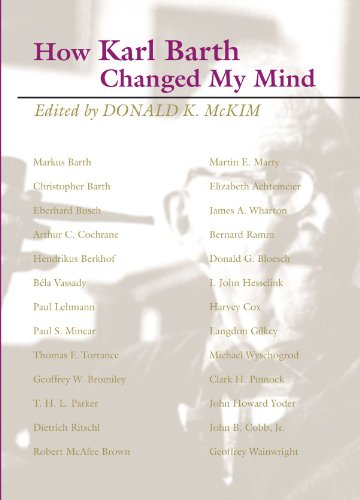How Karl Barth Changed My Mind
Written by Donald K. McKim (ed.) Reviewed By Tony LaneThis book reminds me of the delicious veal and rice paprika that my wife cooks. In it (the book, that is) twenty-six ‘distinguished contemporary theologians’ allegedly write about ‘how Karl Barth changed my mind’. I say allegedly because there is a considerable variety in the essays, with autobiography, anecdotes and theological analysis. The majority of the essays are not really about ‘how Karl Barth changed my mind’. But no matter. This is one of the most fascinating books that I have read for some time—fascinating for the insights that it brings into both Karl Barth himself and the authors of the essays. Some of these are ‘true [Barthian] believers’ who have kept the faith. Others began as Barthians but have since moved on (e.g. Hendrikus Berkhof, Harvey Cox). Others acknowledge their debt to Barth without pretending ever to have been ‘Barthians’. J. H. Yoder’s essay is about ‘how [Barth’s] mind kept changing’—in a free church direction. Clark Pinnock provocatively shows how Barth has made him a better exponent of classical apologetics. And so on. All of these contributions are interesting and stimulating.
But what of the veal and rice paprika? The different essays remind me of the ingredients. Some of the essays contain solid theological meat. Most noteworthy is T. F. Torrance’s ‘My Interaction with Karl Barth’, which is a sustained theological autobiography with special reference to Barth. As the title hints, he is perhaps the only contributor in a position to write about ‘how I changed Karl Barth’s mind’. This is the most substantial essay in the book. Onion provides a sharp taste. This is found in those essays which are frankly critical of Barth. Some authors (such as Hendrikus Berkhof and Donald Bloesch) state clearly where and why they disagree with Barth, which is helpful. Perhaps the bravest author is Dietrich Ritschl, who is the only one to recount anecdotes unfavourable to Barth and the only one openly critical of him as a person.
A number of the essays contain anecdotes about Barth and these provide a light touch to the book as well as being interesting. They may perhaps be compared to the cream topping of the dish. Among these, the essays of Barth’s sons Markus and Christoph and his secretary Eberhard Busch are noteworthy. John Hesselink gives a full account of the ‘reconciliation’ between Barth and Brunner and his role in bringing them together. As the name of the dish implies, the paprika supplies an important spicy dimension. This title perhaps applies best to T. H. L. Parker’s essay in which he shamelessly employs his literary skills to produce a most entertaining and amusing essay, which is by no means lacking in substance.
The rice is perhaps the heaviest and least interesting part of the dish. It would be invidious to single out any essays for this role and it should be stated that none of the essays lacks interest. The rice is made more tasty by the sauce produced out of stock and tomato paste. Leaving aside the question of which is the sauciest essay, the extra taste is supplied by some of the other noteworthy contributions. Among these may be mentioned the essays of Geoffrey Bromiley, the most important translator of Barth into English, and Michael Wyschogrod, the ‘Jewish Barthian’.
The value of this book lies not least in its diversity. The editor could have insisted upon greater uniformity and produced a series of theological autobiographies or of anecdotal reminiscences or of theological assessments. As it is, each author has given what he or she (yes, there is one woman) has to offer and the result is a fascinating, readable and illuminating volume. It will mean little to the reader unfamiliar with Barth, but for those with at least a basic knowledge of him it is a book well worth reading.
Tony Lane
London School of Theology






